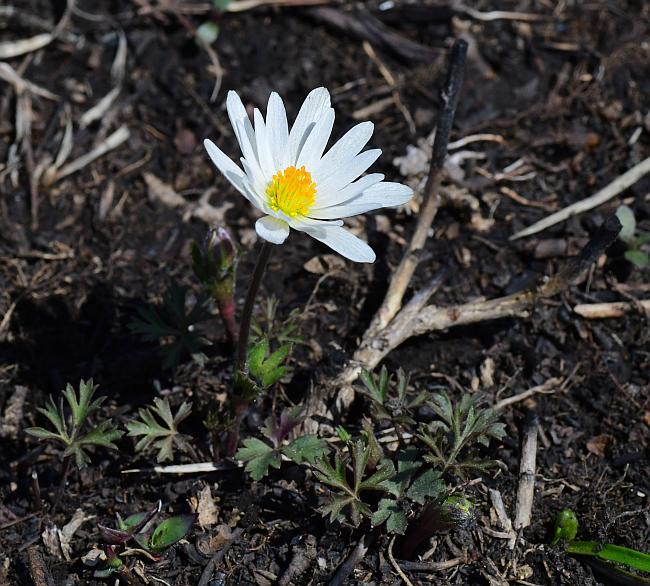Anemone caroliniana Walter
Prairie Anemone

Native
CC = 7
CW = 5
MOC = 26
© SRTurner
Anemone caroliniana WalterPrairie Anemone | |
 |
Native CC = 7 CW = 5 MOC = 26 |
© SRTurner |
|
Family - Ranunculaceae Habit - Perennial forb with rhizomes and tubers.
Stems - Ascending to erect, 6-30 cm, hairy, unbranched, technically leafless. Leaves - Basal leaves 2-5, usually present and green at flowering, once-compound with 3 leaflets, the leaflets usually deeply parted or occasionally merely lobed, the ultimate segments 1-7 mm wide, rounded with a small sharp point to narrowed or tapered to a sharp point at the tip, the margins toothed or entire.
Inflorescence - Solitary flower arising from involucre of 3 whorled bracts positioned 3-16 cm below the flower, these sessile, wedge-shaped, deeply cleft, narrowed or tapered to a sharp point at the tip.
Flower - Actinomorphic, perfect. Sepals 13-21, 10-23 mm long, white or less commonly pale blue, pink, or purple. Petals absent. Stamens numerous, the anthers yellow. Pistils numerous, each with 1 ovule. Styles present.
Fruits - Head of fruits 14-18 mm long, 5-7 mm wide, cylindrical. Fruits elliptic in outline, densely pubescent with woolly hairs more or less concealing the surface, the beak 1.2-1.8 mm long. Receptacle elongated at fruiting. Flowering - March - April. Habitat - Glades, upland prairies, pastures, roadsides, vacant lots, cemeteries, and rocky or sandy open disturbed places, usually on acidic substrates. Origin - Native to the U.S. Lookalikes - None close. Other info. - This delicate early springtime species is found in Missouri mostly in the southwestern quadrant. Elsewhere its range is largely within the central part of the continental U.S., with scattered populations extending to the Atlantic Coast. It tends to prefer acidic soils. This species is easily differentiated from the other Missouri members of the Anemone genus by its more numerous sepals (10-20), vs. usually 5 for other anemones. The sepals are the showy parts of the flower; this species lacks true petals. Photographs taken at Twenty-Five Mile Prairie, Polk County, MO, 4-2-2022 (SRTurner). |